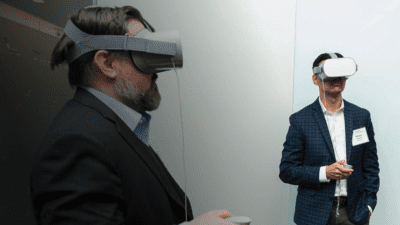
Mastering the Future of Employee Training
December 8, 2020
At a Glance
How Mastercard’s director of technology and innovation scaled 100+ use cases for VR-based training.
Mastercard’s Travis May believes that immersive learning is the future of training. He’s on a mission to not only design training solutions that solve today’s problems, but also to anticipate change and create learning and collaboration tools for tomorrow.
As Mastercard’s director of technology and innovation, Travis heads up the development of virtual reality for training across the company. With more than 20,000 Mastercard employees around the world, Travis’s job is to scale learning innovations that could impact them all, in an effort to contribute both to Mastercard’s bottomline and employees success.
Mastercard originally explored immersive learning technologies as a way to train staff for emergency situations. Travis quickly saw the impact potential and popularity of VR among employees—and his team ramped up its ambitions. They started leading virtual tours for new employees, developing beta training modules in sales and negotiation, and exploring technology that allows for collaboration in real time with employees across the globe.
Now that the technology has evolved enough to allow for affordable scaling, the opportunities seem endless. This is particularly important now as the company navigates new challenges spurred by the COVID-19 pandemic that includes expanded remote learning, training, and working. Next up, Travis and the team start sorting through the 100-plus use cases presented across the company following the rollout of the immersive program for those with the best ROI and opportunity for impact.
Travis is an advocate for immersive learning adoption because he has seen the technology teach Mastercard employees more efficiently and help them collaborate more effectively than the company’s traditional in person training methods.
Travis May spoke at JFF’s Redefining Training at Work, an invitation-only event in San Francisco in February 2020. HR and CSR leaders explored immersive learning technologies, unpacked what they have to offer, and shared implementation strategies.
In this video clip, Travis explains the science behind why immersive learning works to help people retain knowledge more effectively than the company’s traditional training.
Mastercard is constantly looking for ways to better train and connect their people. In this video clip, Travis explains how immersive learning meets Mastercard’s training needs and their initial implementation of the technology.
Related Content

Immersive Learning: A Game Changer for Corporate Talent Development
Corporate leaders explore the potential of immersive learning to help the U.S. workforce adapt to the changing world of work.

Redefining Training at Work
How virtual reality is reshaping corporate learning and employee performance—and what that means for companies today.

2020 Immersive Learning Technology
Advances in immersive technologies create new opportunities for companies, educational institutions, and training providers to build engaging, effective, and affordable systems for training people in simulated environments. At JFFLabs, we scan markets to identify promising…